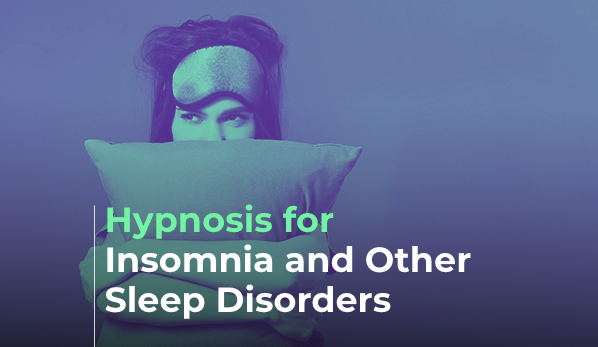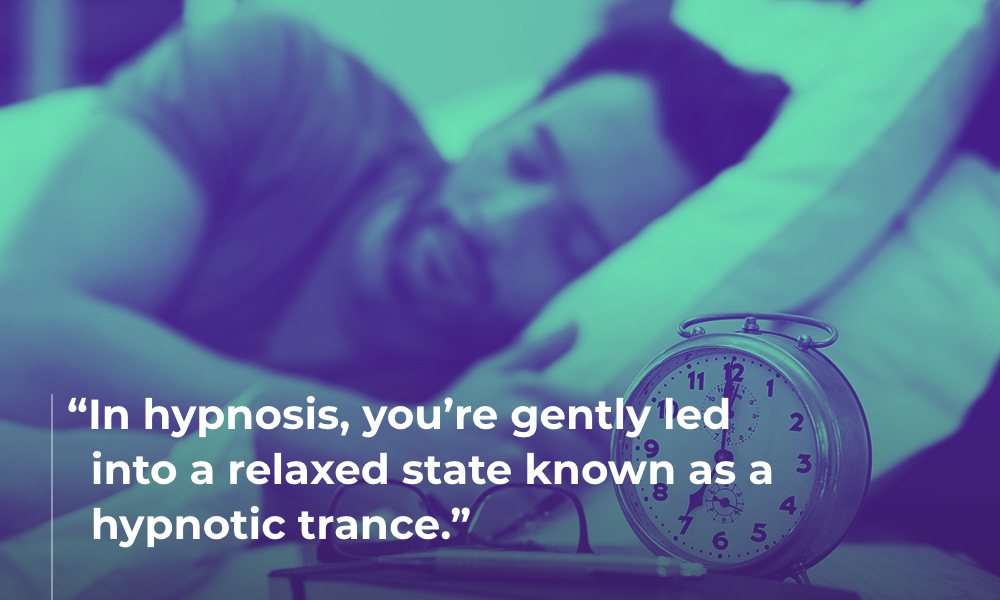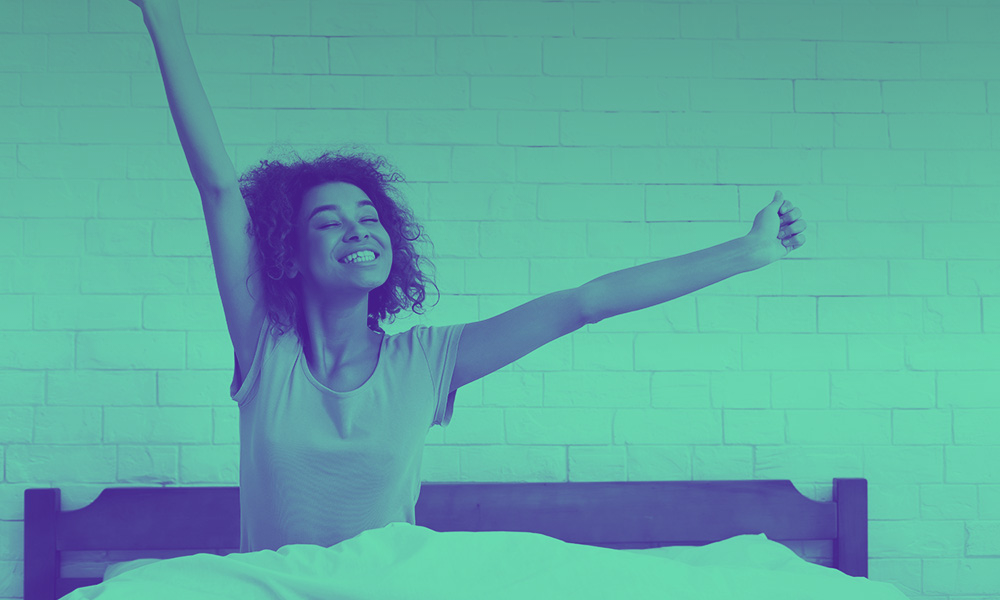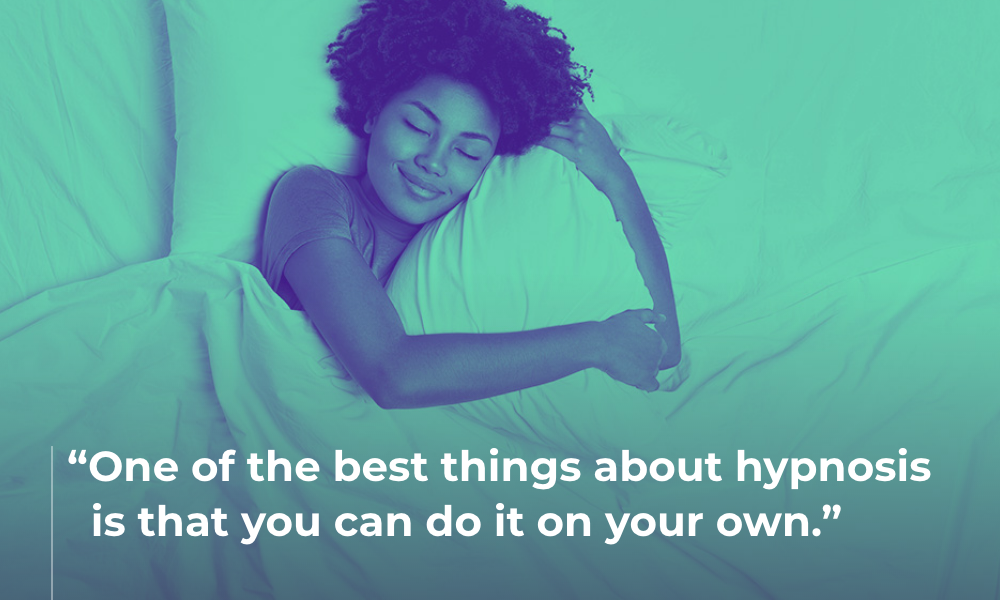Hypnosis is an effective way to address insomnia so you can sleep well and have more productive days. It allows you to fall asleep faster and get better quality sleep. Hypnosis helps you make behavioral changes at the subconscious level. This allows you to integrate better sleep hygiene into your routine.
In this article, we explore how hypnosis for sleep works. We also discuss the sleeping disorders it’s likely to help. Plus, we share some of the science behind sleep hypnosis and provide a self-hypnosis for sleep guide. Let’s get started.
Can Hypnosis Help You Sleep?
In short, yes. Hypnosis can help you get excellent, restorative sleep! It can also help you get better quality slow-wave sleep, which is the kind you need to wake up feeling restored. And not only can hypnosis help you fall and stay asleep, but it can also help with other bedtime-related troubles. It’s been proven to reduce nightmares, sleep terrors, and even sleepwalking.
Plus, alternatives to hypnosis, like sleep aid medication, may come with negative side effects. Hypnosis does not.
How Sleep Hypnosis Works
To understand how sleep hypnosis works, let’s start by exploring how hypnosis works in general. In hypnosis, you’re gently led into a relaxed state known as a hypnotic trance. When you’re in this trance, you’re not asleep, but you are very calm. You’re also hyper-focused on your hypnosis session and nothing else.
In this hypnotic state, it’s easier for your hypnotist to communicate with your subconscious mind. This is the part of your mind that stores all your deeply-held beliefs and motivations. Though you’re not aware of it, the vast majority of the decisions you make each day are directed or influenced by your subconscious mind.
Hypnosis provides you with suggestions that will impact your thoughts and behaviors when you come out of the trance. These hypnotic suggestions are to help you improve your life in one way or another. For example, your hypnotherapist may give you suggestions about deeper relaxation at night or less tension and anxiety before bed.
Hypnosis for sleep can also be used slightly differently than other types of hypnosis. If your goal is to fall asleep, sleep hypnosis can put you directly to sleep. In this way, it’s very similar to meditation for sleep. Most other types of hypnosis only put you in a trance.
How Sleep Hypnosis May be Helpful
95% of adults will experience insomnia in their life, so it’s good to know if sleep hypnosis will work for you. Which sleeping disorders can benefit from hypnosis? Hypnosis can be used for just about any disorder that affects sleep, including acute and chronic insomnia.
It can also help if you aren’t diagnosed with a sleep disorder but are having trouble sleeping. Sometimes, we go through periods of sleeplessness due to stress, worries, anxiety, or tough life events. Hypnosis can also help with issues that lead to disturbed sleep, like frequent nightmares.
Does Sleep Hypnotherapy Work for Everyone?
The vast majority of people benefit from hypnosis for sleep.
Hypnosis is a technique that works best when you’re receptive to it. You’ll see the best results from sleep hypnosis if you approach the process with an open mind.
Even if you think you’re not particularly susceptible to hypnosis itself, hypnosis may still help you sleep. Listening to a sleep hypnosis primer before bed can distract your mind enough to help you drift off.
How You Wake up is Just as Important as How You Sleep
Since we’re talking about the efficacy of hypnosis for sleep, it’s important that we also discuss waking up! As it turns out, waking up at the same time every day is a large factor in sleeping well at night. So, if you’re struggling with insomnia or other sleeping problems, don’t stop at adding hypnosis into your sleep routine. Make sure to set a consistent alarm, too.
Who Is Sleep Hypnosis Right For?
A good night of sleep is essential for everyone’s health, but it’s especially important for those who are looking to optimize their performance at work, in athletics, or in other pursuits where maximum mental acuity is necessary to succeed.
You probably don’t need a scientific study to tell you that you don’t do as well at work when you haven’t slept well. Chances are you have a harder time focusing, don’t feel as creative, may make more mistakes and may even have a shorter temper with your colleagues.
Hypnosis is a safe and proven way to fall asleep faster so that you can get those critical eight hours. Plus, it can also help you stay asleep, so you’re not waking up and losing sleep throughout the night.
How to Do Self-Hypnosis for Sleep
One of the best (and most empowering) things about hypnosis is that you can do it on your own. You can even hypnotize yourself to sleep! If you’d like to try it now, do the following:
- Lie down in your bed and get comfortable. (Ensure you’re completely prepared to sleep for the night, with teeth brushed, lights off, etc.)
- Tense, then relax each body part. Start at your toes and go to the top of your head.
- Draw your attention to your breath. Follow each inhale to its completion, then follow each exhale to its completion. If your thoughts wander from your breath, simply return them to your breath as soon as you notice.
- Now visualize yourself laying in an open meadow on a warm summer’s night. As you look up at the stars, see, feel, and hear yourself slowly start to float up into the stars.
- See the ground below you get smaller and smaller. The meadow fades into your town. Your town fades into your country. And eventually you’re in space watching the whole early slowly spin around.
- Repeat 10 times: Drift and Float. It’s time for sleep.
- Now feel yourself float further away from the earth, the light from the sun getting dimmer and dimmer. Relaxing even further.
- Repeat 10 times: Drift and Float. It’s time for sleep.
- Slow your breathing further, relax deeper, as deep as you can possibly go. Feel every bit of tension leave your body and dissipate out into space.
- Repeat 10 times: Drift and Float. It’s time for sleep. Relax, and fall all the way to sleep.
Although this can be an effective method for falling asleep with hypnosis, you may see some of its downsides immediately. First, you have to memorize the steps. Otherwise, you’ll need to keep your eyes open to read the hypnosis instructions. Open eyes aren’t conducive to sleep. Second, the act of performing these steps alone may need too much focus for you to let go and fall asleep.
That’s why we recommend using a hypnosis app when using hypnosis to fall asleep. When you use an app, a soothing voice will guide you through the hypnosis process, so all you have to do is let go and drift off.
Using Primed Mind for Sleep Hypnosis
Hypnosis is a safe, science-backed method for getting better sleep and improving your sleep habits and sleep quality. It doesn’t have adverse effects like sleep medication can. Plus, hypnosis apps make hypnosis accessible to almost everyone. The next time you need some good quality sleep, try a hypnosis app from the comfort of your own bed.
Primed Mind is a hypnosis app designed by one of the world’s leading mindset coaches. It was developed to help you harness your goals in just 5-20 minutes per day. The expert hypnotists on the Primed Mind app lead you into deep sleep using imagery, counting, soothing sounds, and other hypnosis techniques. Then, they provide hypnotic suggestions that help you make positive changes in your life.
Primed Mind is free to download, and it’s packed with audio recordings to help you get quality rest. With hypnotic primers like “Sleep Now,” “Adapt to a New Timezone,” and “Take a Power Nap,” you’ll be able to get some shut-eye regardless of your situation. Download Primed Mind today and start sleeping better tonight.




